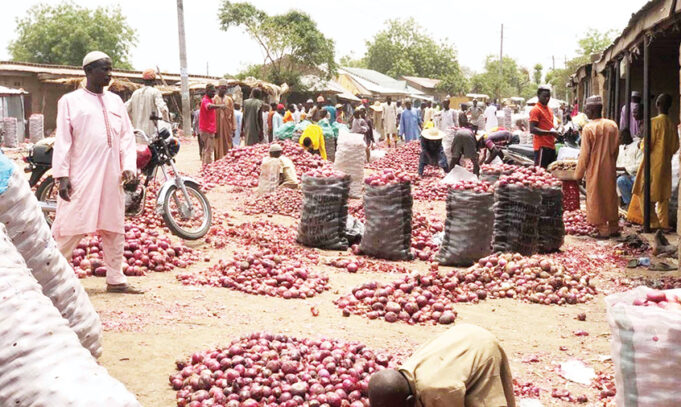
Onion prices have soared to unaffordable levels, with many households now struggling to include the vegetable in their meals.
The price hike is expected to persist for an extended period, making onions an increasingly rare commodity in many homes.
A market survey revealed a worrying trend of rising prices.
In Kano, for example, a large bag of onions now costs N250,000, compared to N120,000 last year, while the medium-sized bag is being sold for N180,000, up from N80,000 in 2023.
Similarly, in Jos, the Plateau State capital, the price for a full bag has reached N250,000, with half bags selling for N125,000. Other smaller varieties range between N215,000 and N230,000.
Musa Ubale, Secretary of the Farin Gada Vegetable Market in Jos, confirmed that prices for a full bag had been stable at N250,000 for some time, noting that the price was previously N170,000.
In addition to onions, the price of pepper has also seen a notable increase, with a large bag now ranging from N40,000 to N45,000, and smaller bags priced between N30,000 and N35,000.
Farmers in Kano have indicated that this price surge may last well beyond this year’s harvest, citing multiple factors affecting both production and supply.
Alhaji Aliyu Isa Maitasamu, President of the National Onion Producers, Processors, and Marketers Association of Nigeria, attributed the price surge to inflation, which has seen the cost of onion seeds rise by 150%, from N50,000 to N150,000.
Additionally, high prices for chemicals and fertilizers, coupled with the impact of flooding on onion-producing regions, have all contributed to the scarcity.
Floods have devastated key farming areas in Sokoto, Zamfara, Kebbi, and Borno—regions known for onion production.
In Jos, Musa Ubale pointed out that neighboring countries like Cameroon and Ghana are purchasing large quantities of Nigerian pepper, further driving up demand and prices.
Alhaji Sama’ila Nura, an onion farmer from Kano, cited the absence of onions from Niger Republic once a key supplier as another major factor in the current scarcity.
He explained that onions from Niger had traditionally helped meet local demand, but due to the military junta’s closure of trade routes, no supplies had come through this year.
Moreover, the rising costs of agro-inputs and poor storage methods have exacerbated the situation, leaving only Kano and Jigawa as the main suppliers during the wet season.
Despite these challenges, farmers have begun planting for the 2025 dry season, with large-scale onion cultivation underway at irrigation sites like Kadawa and Garun Malam.
However, high input costs continue to pose a major challenge for farmers.
In the open seed markets in Kano, a cup of onion seed is now sold for N30,000, and a measure (mudu) costs around N130,000.
This marks the highest price for onion seeds in over a decade.
One bed of onion seedlings now costs N100,000 to N105,000, a dramatic increase from last year’s price of N8,000 to N10,000.
Ibrahim Abbah, another farmer, expressed doubts that prices would drop anytime soon, particularly given the rising demand for Nigerian onions from other countries.
Nigeria is now exporting onions to countries like Ghana, Benin Republic, and even China and India, reducing the local supply.
Malam Mustapha Adam, a former official of the Onion Farmers Association of Nigeria, explained that the increasing global demand for Nigerian onions, combined with rising production costs, has intensified the scarcity.
Despite the significant revenue generated by onion farming, he lamented that onion farmers have never received any government grants or been included in federal agricultural intervention programs.
With these dynamics at play, Nigerian households will have to contend with rising food costs as onions and peppers become more difficult to obtain.

















